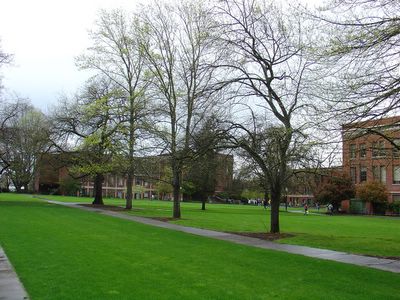A Day for Reading
Day Seventeen: Taxes are completed and are in the mail, something for which I am grateful seeing as how money has been unusually tight lately. The meager refund, approximately 200 hundred bucks, will help matters some. Taxes were one major task that I can cross off my list. I have also managed to arrange things at school so that I can stay in my student apartment until the end of Fall Term, even though I will not be attending class during Spring or Summer. Just today, I got the official approval I needed from the housing office. I had thought that they would need to meet with me personally, but the disability office worker that I have been talking to had smoothed things out for me. (The housing director wished me good luck with my plan to re-enroll in the Fall, an odd, but touching note. It struck me as odd in that it was a personal note out of what I expected to be a more bureaucratic process.)

Spring Weather
As for the other things that are still unfinished, I have yet to hear back whether or not my Leave of Absence has been finally approved. If it has been, then everything should be fine, and I can focus entirely on completing my unfinished papers. If not, I will have to quickly make other plans, including attending (as a guest) a couple writing classes taught by my colleagues--a requirement for one of my unfinished classes. I also need to meet with the Financial Aid counselor about some loan options. I have been putting this task off because I only have a very slim hope of getting what I want. Consequently, I feel a little intimidated and daunted by asking for something that I will not be getting. However, this is something that I definitely will do in the coming week, all feelings of trepidation aside.
My actual school work has been picking up. Currently, I am re-reading Mary Barton for my Victorian Class. From what I have gathered from the novel's Introduction, Elizabeth Gaskell, the author, wanted to write a novel about the working poor, thereby illuminating their plight to the upperclasses. And the upperclasses, having read her novel, would somehow be so moved by their feelings of sympathy for the poor that they would help alleviate their suffering. But, according to the author of the introduction, Gaskell seems to have omitted any recognition that the upperclasses were responsible for that suffering. Apparently, Gaskell felt that the poor's "problem" of being mad at the rich for their greed and luxury could be solved if the rich could learn how to emotionally sympathize with the poor, not rethink their own culpability in the economic oppression. I suppose it would be as if someone hit you in the head, and then said, "You poor dear! You somehow have gotten a bruise on your head." I've only just started, but I'll be interested to see if this is how the novel plays out.

Spring Weather
As for the other things that are still unfinished, I have yet to hear back whether or not my Leave of Absence has been finally approved. If it has been, then everything should be fine, and I can focus entirely on completing my unfinished papers. If not, I will have to quickly make other plans, including attending (as a guest) a couple writing classes taught by my colleagues--a requirement for one of my unfinished classes. I also need to meet with the Financial Aid counselor about some loan options. I have been putting this task off because I only have a very slim hope of getting what I want. Consequently, I feel a little intimidated and daunted by asking for something that I will not be getting. However, this is something that I definitely will do in the coming week, all feelings of trepidation aside.
My actual school work has been picking up. Currently, I am re-reading Mary Barton for my Victorian Class. From what I have gathered from the novel's Introduction, Elizabeth Gaskell, the author, wanted to write a novel about the working poor, thereby illuminating their plight to the upperclasses. And the upperclasses, having read her novel, would somehow be so moved by their feelings of sympathy for the poor that they would help alleviate their suffering. But, according to the author of the introduction, Gaskell seems to have omitted any recognition that the upperclasses were responsible for that suffering. Apparently, Gaskell felt that the poor's "problem" of being mad at the rich for their greed and luxury could be solved if the rich could learn how to emotionally sympathize with the poor, not rethink their own culpability in the economic oppression. I suppose it would be as if someone hit you in the head, and then said, "You poor dear! You somehow have gotten a bruise on your head." I've only just started, but I'll be interested to see if this is how the novel plays out.
14 April 2005
Comments:
Post a Comment
